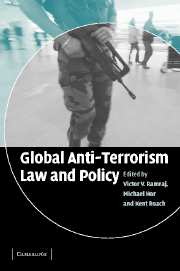Book contents
- Frontmatter
- Contents
- List of contributors
- Acknowledgements
- 1 Introduction
- PART ONE Theoretical Perspectives on Anti-Terrorism Law and Policy
- PART TWO A Comparative Study of Anti-Terrorism Measures
- PART THREE Anti-Terrorism Law and Policy in Asia
- 13 Law and terror: Singapore stories and Malaysian dilemmas
- 14 Indonesia's Anti-Terrorism Law
- 15 The Philippines: the weakest link in the fight against terrorism?
- 16 Japan's response to terrorism post-9/11
- 17 Legal and institutional responses to terrorism in India
- 18 Enacting security laws in Hong Kong
- PART FOUR Regional Cooperation
- PART FIVE Anti-Terrorism Law and Policy in the West
- PART SIX Anti-Terrorism Measures in Africa, the Middle East and Argentina
- Index
14 - Indonesia's Anti-Terrorism Law
Published online by Cambridge University Press: 21 July 2009
- Frontmatter
- Contents
- List of contributors
- Acknowledgements
- 1 Introduction
- PART ONE Theoretical Perspectives on Anti-Terrorism Law and Policy
- PART TWO A Comparative Study of Anti-Terrorism Measures
- PART THREE Anti-Terrorism Law and Policy in Asia
- 13 Law and terror: Singapore stories and Malaysian dilemmas
- 14 Indonesia's Anti-Terrorism Law
- 15 The Philippines: the weakest link in the fight against terrorism?
- 16 Japan's response to terrorism post-9/11
- 17 Legal and institutional responses to terrorism in India
- 18 Enacting security laws in Hong Kong
- PART FOUR Regional Cooperation
- PART FIVE Anti-Terrorism Law and Policy in the West
- PART SIX Anti-Terrorism Measures in Africa, the Middle East and Argentina
- Index
Summary
Introduction
Soon after the Bali Bombing occurred on 12 October 2002 killing 202 people, mostly foreigners and holidaymakers, the government was quick to legislate an Anti-Terrorism Law. On 18 October 2002 the President issued Government Regulation in Lieu of Law (hereinafter referred to as GRL) No. 1 of 2002 concerning the Eradication of Criminal Acts of Terrorism. On the same day the Government issued GRL No. 2 of 2002 making GRL No. 1 retroactively applicable to the Bali bombings. In 2003, both GRL 1 and 2 of 2002 were confirmed by the legislature and have become law (GRL 1 is referred to as the ‘Anti-Terrorism Law’).
This chapter will describe Indonesia's Anti-Terrorism Law and the difficulties and public controversy the government has faced in trying to implement it. The chapter will show how the judiciary has attempted to curb some of the Law's perceived excesses and it will review recent legal developments. It will be argued that, for Indonesia, terrorism is a complex and multi-faceted issue that cannot be addressed simply by promulgating a new law.
The substance
The Anti-Terrorism Law provides four reasons for its promulgation. First, terrorism had ‘claimed human lives intolerably and raised widespread fear among the community [and] caused loss of freedom and damage of property’. Second, terrorism had maintained extensive networks, posing a threat to national and international peace and security. Third, national legislation was required to implement international conventions relating to terrorism.
- Type
- Chapter
- Information
- Global Anti-Terrorism Law and Policy , pp. 295 - 306Publisher: Cambridge University PressPrint publication year: 2005
- 2
- Cited by



